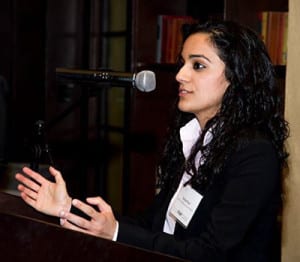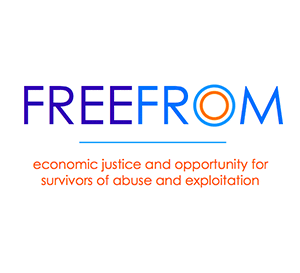
By Andrew Cohen
The most common reason why victims of domestic violence and sex trafficking stay in abusive and exploitive situations? They can’t afford to leave. That maddening reality prompted Sonya Passi ’13 to launch FreeFrom, a pioneering national nonprofit that wants to push for legislative reforms and help survivors find their financial footing.
“If victims are able to leave without facing poverty and homelessness, a life free from violence becomes attainable,” Passi said. “No one should have to stay in an abusive or violent situation because they can’t afford safety.”
FreeFrom is adopting a three-prong approach on behalf of victims: filing civil suits against their abusers, advocating for public policy changes, and offering support to those who want to start their own businesses. Passi is busily building a full-time staff of five to seven people to execute her vision.
“FreeFrom is a brilliant concept which fills a vacuum in advocacy for victims of abuse,” said Joan Meier, a George Washington University law professor and the founder of DV Leap, a legal advocacy nonprofit for victims of domestic violence and their children. “Economic autonomy is critical to women’s ability to escape abusive situations, yet has been barely addressed until now.”
Passi is coordinating with leaders such as Meier and enlisting lawyers to take on cases and provide business help—from training on the paperwork needed to establish small companies to facilitating micro-loans. Jones Day, Kirkland Ellis, and Sheppard Mullin have already offered their assistance.
Between 25 and 50 percent of domestic violence victims report that they lost a job, at least in part, due to their abuse. Each year, such violence costs U.S. employers an estimated $13 billion and commercial sexual exploitation generates about $100 billion globally in illegal profits.
While there exists a large body of tort law designed to allow abuse and trafficking victims to sue in civil court for monetary damages, survivors rarely use it.
“Most don’t even know it’s an option,” Passi said. “This isn’t a handout or continued support. It’s the price an abuser or trafficker must pay for their acts. It’s justice. And it’s what these survivors rightfully deserve.”
Extending her reach
In 2012, while a student at Berkeley Law, Passi and classmate Alexandrea Scott launched the Family Violence Appellate Project (FVAP), a legal advocacy nonprofit. The first of its kind in California, FVAP mobilizes pro bono appellate representation for the state’s domestic violence survivors.
 The organization quickly achieved notable appellate successes, creating published precedential case law that trial courts now follow to the benefit of survivors across the state. For her achievements, Passi won the UC Berkeley Chancellor’s Award for Public Service and the Barbara Nachtrieb Armstrong Award for Outstanding Advocacy on Behalf of Social Justice for Women.
The organization quickly achieved notable appellate successes, creating published precedential case law that trial courts now follow to the benefit of survivors across the state. For her achievements, Passi won the UC Berkeley Chancellor’s Award for Public Service and the Barbara Nachtrieb Armstrong Award for Outstanding Advocacy on Behalf of Social Justice for Women.
FVAP’s success motivated Passi to expand her efforts to a national platform. FreeFrom will pursue reform strategies to increase the statute of limitations for claims of abuse and trafficking, incorporate domestic violence within homeowners insurance, and establish more flexibility from credit card companies. Next month, Passi will meet with Illinois Senator Dick Durbin and other officials in Washington, D.C.
“Financial abuse is a pervasive feature of abusive relationships that doesn’t get nearly the same attention as the physical and emotional aspects of this violence,” she said. “It’s all about control. Often the victim is forbidden from working, or forced to hand over her paycheck. The abuser controls all the credit cards and bank accounts and sometimes secretly establishes credit cards in the victim’s name. This often results in a destroyed credit rating which makes it tough to rent an apartment, buy a car, get a loan … it can make it seem impossible to leave.”
After graduating from Berkeley Law, Passi worked in investment banking at Morgan Stanley for two years. Launching FreeFrom unites her passion for helping victims of abuse and trafficking, her legal training, and her finance background.
Eager to address a glaring need—and wary not to replicate the efforts of other nonprofits—Passi has quickly become a welcome ally among leaders in the field.
“Overcoming economic barriers is critical for victims seeking to leave abusive situations,” said Kim Grady, president and CEO of the National Network to End Domestic Violence. “A program such as FreeFrom can remove these barriers, offer support, and help survivors prepare for an abuse-free life.”